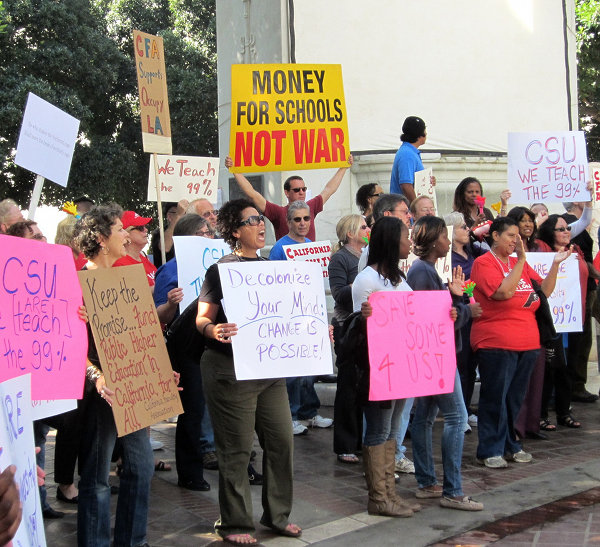
Budget cuts have slashed college workforces and denied hundreds of thousands of students the seats they worked for. Yet some faculty and staff leaders claim that budgets are controlled by legislatures, not by union contracts, so their unions can’t do anything. Now there’s a better response: on Lincoln’s Birthday (February 12) the Campaign for the Future of Higher Education kicked off a series of events in 21 states, to provoke debate about how to defend Americans’ right to higher education.
Their first step was to present three reports on what could be done. The first, Making All Public Higher Education Free identifies tax breaks which could be ended to pay the whole tuition bill for the nation’s students. It was prepared by Bob Samuels, president of the lecturers union at the University of California. The second report, about Restoring Quality and Access to Public Higher Education, uses California as an example of how a fairer budget could restore funding to the levels of 2000. It was written by Stanton Glantz, professor of medicine at UCSF.
Finally, the report of Rudy Fichtenbaum, Ohio-based national president of the American Association of University Professors, is about a Financial Transaction Tax which would make Wall Street pay a fairer share of the costs of higher education for the public. The three reports can be found at www.futureofhighered.org.
By taking these ideas out to the nation’s students, faculty and staff would help thousands see a better alternative than just slashing budgets and handing education over to corporations like the University of Phoenix. It would change the debate from “there’s no money” to “where did Americans’ money go?” That’s a crucial step for the movement, to learn how their enemy is not just this or that college president or politician, but the class of speculators and billionaires whose interests they serve. And it would lead to a real public dialogue about what kind of society is possible, if only the public can break the power of that class.
Lincoln’s birthday was chosen as a launch date because he signed the Morrill Act of 1862, giving federal land for the creation of public colleges and universities. “What we are missing today is the commitment and the courage that Lincoln and Morrill had,” said Lillian Taiz, president of the faculty union for the California State University system. But we’re also missing the kind of mass movement that understood back then that the American people’s well-being required ending the power of the slave-owning class, and so they pushed Lincoln along step-by-step until he agreed to it. CFHE—the Campaign for the Future of Higher Education provides one step that education activists can take to push their leaders along today.
(Steve Teixeira serves on the Steering Committee of the CFHE, representing Academic Professionals of California.
